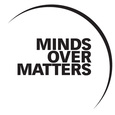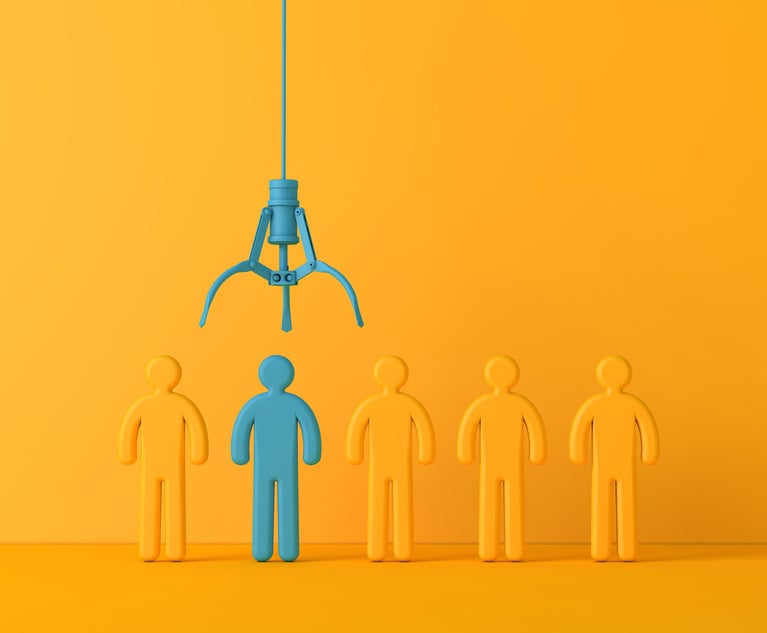The Source of Lawyer Stress: Firm Culture
With the mindfulness movement sweeping the nation, it is natural to wonder how law firms are contributing to the lawyer experience.
May 23, 2019 at 12:11 PM
8 minute read
 Marcie Borgal Shunk.
Marcie Borgal Shunk.
 Waiting in line to check out at Whole Foods, I saw a headline that caught my eye. It was tiny, barely noticeable in black ink against a blue background in the upper left corner of a magazine I had never seen before. The headline read "How Mind Training Makes Better Lawyers." This was in June 2013 and the magazine was called Mindful. Six years later, the watershed moment seems to have arrived for lawyers and mindfulness.
Waiting in line to check out at Whole Foods, I saw a headline that caught my eye. It was tiny, barely noticeable in black ink against a blue background in the upper left corner of a magazine I had never seen before. The headline read "How Mind Training Makes Better Lawyers." This was in June 2013 and the magazine was called Mindful. Six years later, the watershed moment seems to have arrived for lawyers and mindfulness.
The ABA adopted resolutions at its mid-year meeting focused on improving lawyer well-being. Law.com just launched "Minds Over Matters," a yearlong effort dedicated to raising awareness of mental health and addiction issues that plague the legal sector. With the mindfulness movement sweeping the nation—an entire special edition of Time Magazine this month is devoted to "The New Mindfulness"—it is natural to wonder how law firms, the organizations in which lawyers operate, are contributing to the lawyer experience.
The obvious culprit, of course, seems to be the billable hour. The pressure to work more hours inherently drives people to spend too much time working and not enough time doing the things that alleviate stress. Yet billable hours alone can't be to blame. Utilization rates are down significantly. The most recent "Legal Executive Institute Report on the State of the Legal Market 2019″ shows average hours, which dropped during the 2008-2009 recession, never recovered. In 2018, average monthly billable hours land at just 122 per month, or about 1,400 a year.
Then there's the nature of the work, particularly high-stakes, high-demand cases. These types of deadlines and pressures certainly heighten stress levels. Yet the percentage of these cases is relatively small compared to the number of lawyers practicing. So, if lawyers are working less and high-pressure matters are limited, why isn't their quality of life improving?
The answer, most likely, lies in an interconnected web of: societal trends, including technology and globalization, which have exaggerated expectations in professional services; and law firm cultures that idolize heroic efforts to place clients and the firm above all else. Together, these two embedded constructs wreak havoc on the individual, literally impacting brain chemistry (e.g., the hit of dopamine one experiences at the familiar ping of an email alert) and promoting activities, behaviors and feelings proven to be detrimental to one's well-being.
Technology, Globalization and 24/7 Access
As many positive attributes have come from advances in technology (the replacement of digging through rooms full of discovery boxes with a blank search term box being a personal favorite), technology brings with it too a host of negative impacts. Research links technology to poor sleep, isolation and anxiety and depression. It can also be incredibly distracting, particularly for lawyers who live under the unrealistic expectation they will be available 24/7. McGill University professor Daniel Levitin claims, "When trying to concentrate on a task, an unread email in your inbox can reduce your effective IQ by 10 points." Layer on the increasingly global nature of the businesses with which lawyers engage and technology becomes an evil force demanding connectivity at all hours of the day and night.
Though not unique to the legal industry, the reality of clients and law firm cultures that do not allow for disconnection places undue strain on lawyers. Establishing clear boundaries and outlining expectations for what is reasonable can go a long way to keeping clients happy and making lawyers feel empowered to make more balanced decisions. One of my favorite examples came in the form of an auto-respond message from a Canadian lawyer leader which (paraphrased) read, "I am currently in [Exciting City] for the [Targeted Industry Association Conference]. While I am monitoring my email, it is admittedly in the spaces between sessions and events, while bustling through crowds and trying to connect with colleagues, new and old in over-airconditioned and brightly lit rooms. My response time, therefore, may lag a bit (though I'll do my best!)." How better to charm someone and clearly set expectations than a well-crafted note demonstrating industry savvy and a sense of humor.
Hero Leaders and Hero Cultures
Alas, setting boundaries and allowing for personal time does not come in the form of protocols alone. Law firm culture has long celebrated the feats of those who manage to close a deal at the 11th hour or pull an all-nighter in pursuit of the elusive smoking gun. Tolerance for failure is low and expectations can be extreme. A leader at one of my first firms used to pride himself on hiring "insecure overachievers"—a group of which I was one at the time and a practice he claimed was modeled after the big consulting firms. These individuals, like most law firm cultures, find mistakes untenable. And they are willing to go to tremendous lengths to attain lofty goals—even at the expense of themselves and, often, those around them.
The tenor at many (though not all) major consulting firms has begun to shift some, with emphasis in recent years on creating more inclusive and balanced cultures. This "at all costs" atmosphere, though, still resonates through the halls of many law firms. When I ask rooms full of lawyers if their firms encourage failure, most smirk and glance smugly around the room. Some laugh. Tolerate failure? A few hands go up. For everyone else, the message is clear: failure is a sign of weakness or vulnerability.
The irony, according to experts in culture and leadership, is vulnerability is essential to healthy cultures and people. Daniel Coyle, author of "Culture Code," counts shared vulnerability as one of the tenets of a productive, positive culture. Brené Brown, renowned expert in leadership, says "If you don't understand vulnerability, you cannot manage and lead people. If you're not showing up vulnerably as a leader, you can't expect anyone to follow you—period." Cultures that prize perfection, thus, squash the very essence of what makes for higher employee engagement, greater satisfaction and enviable leaders.
Law firm cultures, in particular, are guilty of this predisposition (alongside other industries such as financial services, made infamous in films like "Wall Street," "The Big Short" and "Boiler Room"). The best way to combat the effect of culture is to evaluate it—honestly—and take steps to deliberately improve people's experiences. Few law firms utilize recognized tools to assess culture, instead falling back on the notion culture can not be measured or, perhaps worse, "there is nothing wrong with our collegial/collaborative culture."
Global 500 and Fortune 1000 companies routinely evaluate their organizational culture and effectiveness to ensure consistency, facilitate integration or better understand the dynamics around specific challenges. As to the claim law firm culture doesn't warrant change? Lawyer experience shows otherwise. High turnover rates, a revolving door of lateral moves and little progress on diversity efforts are indicators something is amiss. Further, cultural experience is not limited to partners alone. Consider:
- Do all employees—not just lawyers—feel safe and share a clear purpose?
- Are leaders vulnerable in public or only behind closed doors with a select few?
- Does our collaborative culture extend outside of the partnership?
To truly improve lawyer well-being will demand a candid self-assessment of the one thing law firms hold most dear: their culture. This concept is not intended to be at odds with those encouraging mindfulness, creating greater self-awareness or eliminating the stigma associated with mental illness or addiction. Quite the opposite. Transforming the culture and structure of law firms can be a complement, an exploration of the root cause of what is contributing to these emotional and mental patterns to begin with, and an effort to move in tandem toward a place where the organization aligns with, rather than challenges, the best interest of the individuals—all of them—who comprise the law firm.
Read more:
Minds Over Matters: An Examination of Mental Health in the Legal Profession
Marcie Borgal Shunk is president and founder of The Tilt Institute, a firm dedicated to unveiling new perspectives on law firm growth through intelligence, innovation and intuition. She specializes in helping law firm leaders make better, data-driven business decisions. Shunk is also a member of the ALM Intelligence Fellows Program. More information on the ALM Intelligence Fellows Program can be found here.
This content has been archived. It is available through our partners, LexisNexis® and Bloomberg Law.
To view this content, please continue to their sites.
Not a Lexis Subscriber?
Subscribe Now
Not a Bloomberg Law Subscriber?
Subscribe Now
NOT FOR REPRINT
© 2025 ALM Global, LLC, All Rights Reserved. Request academic re-use from www.copyright.com. All other uses, submit a request to [email protected]. For more information visit Asset & Logo Licensing.
You Might Like
View All
Rising Varied Investment Products, Regulatory Activity Drive Demand in Investment Funds

NHL Agent, Business Can't Sell Assets to Dodge $1M in Judgments, Federal Judge Says
Trending Stories
- 1Departing Attorneys Sue Their Former Law Firm
- 2Pa. High Court: Concrete Proof Not Needed to Weigh Grounds for Preliminary Injunction Order
- 3'Something Else Is Coming': DOGE Established, but With Limited Scope
- 4Polsinelli Picks Up Corporate Health Care Partner From Greenberg Traurig in LA
- 5Kirkland Lands in Phila., but Rate Pressure May Limit the High-Flying Firm's Growth Prospects
Who Got The Work
J. Brugh Lower of Gibbons has entered an appearance for industrial equipment supplier Devco Corporation in a pending trademark infringement lawsuit. The suit, accusing the defendant of selling knock-off Graco products, was filed Dec. 18 in New Jersey District Court by Rivkin Radler on behalf of Graco Inc. and Graco Minnesota. The case, assigned to U.S. District Judge Zahid N. Quraishi, is 3:24-cv-11294, Graco Inc. et al v. Devco Corporation.
Who Got The Work
Rebecca Maller-Stein and Kent A. Yalowitz of Arnold & Porter Kaye Scholer have entered their appearances for Hanaco Venture Capital and its executives, Lior Prosor and David Frankel, in a pending securities lawsuit. The action, filed on Dec. 24 in New York Southern District Court by Zell, Aron & Co. on behalf of Goldeneye Advisors, accuses the defendants of negligently and fraudulently managing the plaintiff's $1 million investment. The case, assigned to U.S. District Judge Vernon S. Broderick, is 1:24-cv-09918, Goldeneye Advisors, LLC v. Hanaco Venture Capital, Ltd. et al.
Who Got The Work
Attorneys from A&O Shearman has stepped in as defense counsel for Toronto-Dominion Bank and other defendants in a pending securities class action. The suit, filed Dec. 11 in New York Southern District Court by Bleichmar Fonti & Auld, accuses the defendants of concealing the bank's 'pervasive' deficiencies in regards to its compliance with the Bank Secrecy Act and the quality of its anti-money laundering controls. The case, assigned to U.S. District Judge Arun Subramanian, is 1:24-cv-09445, Gonzalez v. The Toronto-Dominion Bank et al.
Who Got The Work
Crown Castle International, a Pennsylvania company providing shared communications infrastructure, has turned to Luke D. Wolf of Gordon Rees Scully Mansukhani to fend off a pending breach-of-contract lawsuit. The court action, filed Nov. 25 in Michigan Eastern District Court by Hooper Hathaway PC on behalf of The Town Residences LLC, accuses Crown Castle of failing to transfer approximately $30,000 in utility payments from T-Mobile in breach of a roof-top lease and assignment agreement. The case, assigned to U.S. District Judge Susan K. Declercq, is 2:24-cv-13131, The Town Residences LLC v. T-Mobile US, Inc. et al.
Who Got The Work
Wilfred P. Coronato and Daniel M. Schwartz of McCarter & English have stepped in as defense counsel to Electrolux Home Products Inc. in a pending product liability lawsuit. The court action, filed Nov. 26 in New York Eastern District Court by Poulos Lopiccolo PC and Nagel Rice LLP on behalf of David Stern, alleges that the defendant's refrigerators’ drawers and shelving repeatedly break and fall apart within months after purchase. The case, assigned to U.S. District Judge Joan M. Azrack, is 2:24-cv-08204, Stern v. Electrolux Home Products, Inc.
Featured Firms
Law Offices of Gary Martin Hays & Associates, P.C.
(470) 294-1674
Law Offices of Mark E. Salomone
(857) 444-6468
Smith & Hassler
(713) 739-1250










